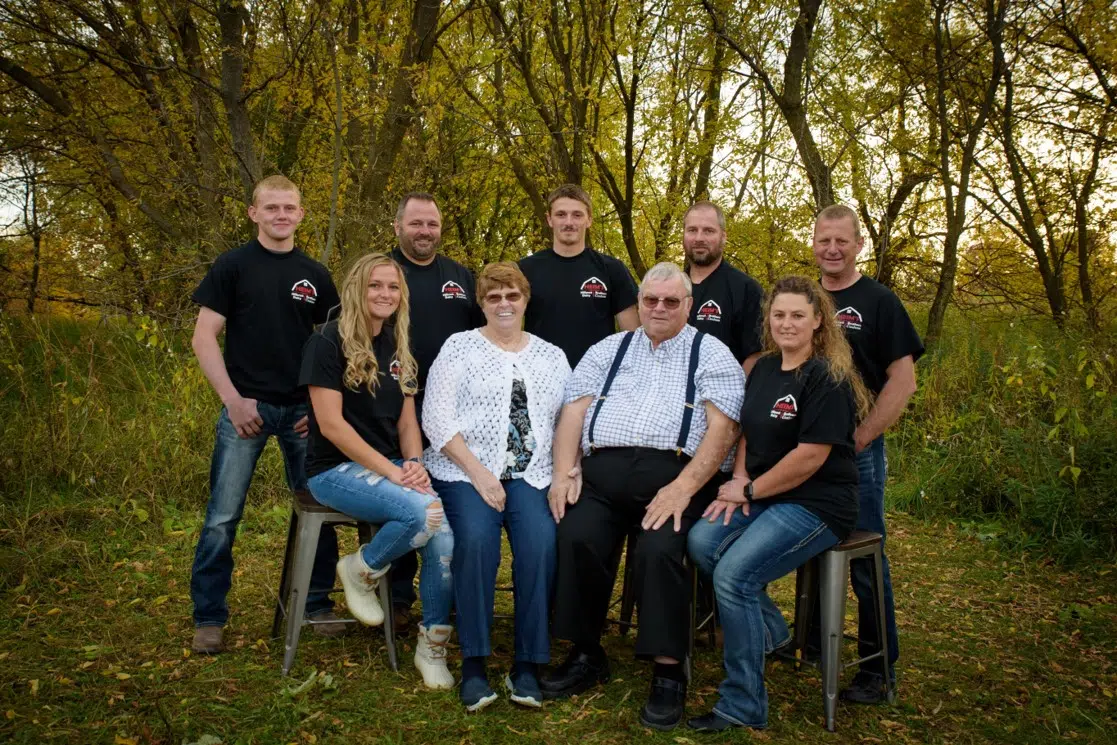ALGOMA, Wis. ― The Heim family pride themselves on doing things right for the environment at Heim’s Hillcrest Dairy. Through their custom chopping and manure hauling business, they are also helping other farmers to do the same with conservation practices.
Lloyd Heim operates the farm with his sons, Jeremy, Scott and Rod; Jeremy’s son, Ben, and daughter, Kiley; Rod’s son, Sam; and Scott’s wife, Carrie. The family formed the partnership in 2000 when the farm milked 200 cows; they are now up to 825 cows and run about 1,805 acres. Their custom chopping and manure hauling business, Heim Brothers Custom, was started in 2015. They now chop for four farms and haul manure for 17 farms.
The Heims joined Peninsula Pride Farms, a farmer-led watershed conservation group with nearly 60 members, because they wanted to help improve the quality of life in the county.
“We started our custom business in 2015 because we saw room for improvement on our farm and a need for other farms in the area struggling with proper manure applications due to weather and soil conditions,” Jeremy Heim said. “We felt we could be a part of the change to make things better.”
As a PPF member, the farm has learned much about incorporating best conservation practices, such as cover crops, no-till, low-disturbance manure application and planting green. The farm continues to add 20% more acres in cover crops each year and now has 85% of corn acres in no-till.
Some benefits the Heims noticed with conservation are fields drying quicker, soil accepting liquid nutrients much better, increasing corn production, and time and money savings by not having to do spring field work. In 2021, they joined a digester project where they haul manure 25 miles to a digester, and 55 days later, they get their liquid nutrients back.
“Being sustainable is important to us. Having a farm with large family involvement and being involved in the community is essential to us,” Heim said. “We want to be farming 100 years from now, so our employees and customers must see us doing the right thing for our community.”
Expanded impact
PPF continues to grow across Kewaunee and southern Door counties. The group represents 90,310 acres and 86,970 dairy animals, beef cattle and pigs. The group collaborates with university researchers, environmental groups and community leaders to implement innovative farming practices that protect and improve ground and surface water in a geologically sensitive part of the state.
Last year, PPF members planted 25,716 acres in cover crops, used low-disturbance manure application on 10,373 acres and reduced tillage on 35,949 acres. Members also implemented soil sampling and nutrient management planning. Overall, the group has seen a 60% increase in acres using conservation practices since the group started tracking in 2016.
Modeling of the data shows that these practices can significantly reduce the chance of harmful runoff into streams and lakes. In 2022, farmers potentially prevented an estimated 101,415 pounds of phosphorus from leaving the fields and reduced 65,525 tons of sediment erosion, along with reducing carbon dioxide equivalents by 11,194 tons, according to an analysis shared by Farmers for Sustainable Food, the state Department of Agriculture, Trade and Consumer Protection; and The Nature Conservancy.
For comparison, 100 tons of sediment is about 10 standard dump truck loads, and 1 pound of phosphorous in a lake or stream has the potential to cause the growth of up to 500 pounds of algae, which can degrade water quality. The amount of greenhouse gas emissions reduced equals 2,412 cars driven for a year.
The modeling-based analysis estimated the potential impact of cover crops, low-disturbance manure application and reduced tillage compared to more conventional methods typical to the group’s area.
The Nature Conservancy is a key supporter of PPF and helps to provide ideas for new conservation practices.
 |
“The PPF farmers are working hard to follow their nutrient management plans, demonstrated in the increasing number of conservation practices each farmer uses on their fields,” Steve Richter, TNC’s director of agriculture strategies in Wisconsin, said. “PPF farmers are doing their part to reduce impacts to water and the changing climate, and in doing so, save money on fertilizer costs by keeping nutrients in the soil.”
Jeremy Heim is passionate about sharing knowledge from the farm’s experience and what his family can learn through the farmer-led group. They are working on a video series to share with a larger audience to promote the benefits of conservation.
“We are ensuring the knowledge is shared with our customers as well as our county and local DNR level,” he said. “We strive to grow those relationships to help the government agency to learn with us on why we do what we do. We invite them out to ride with us and see our actions in the fields to show how we are using best management practices to improve water quality and soil health.”
BY THE NUMBERS
Number of acres covered by conservation practices among Peninsula Pride Farms members:
- 2016 ― 197,405
- 2020 ― 224,051
- 2021 ― 356,881
- 2022 ― 343,598
*Multiple conservation practices can be used on a farm field
Potential impact of conservation practices in 2022:
- Phosphorus runoff reduction ― 101,415 pounds
- Sediment erosion reduction ― 65,525 tons





